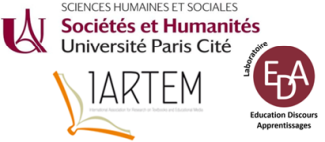“Epoch booklets” as open or closed – progressive education, citizenship education and history education in two Norwegian textbooks from the 1940s
Keywords: Progressive education, textbooks, history education, citizen education
In 1935, a new school act for Norwegian secondary schools was passed. A committee, named the plan committee, was set up to prepare the implementation of the school act and the drafting of new curricula. A central goal was introducing principles of arbeidsskole (working school/activity school). This term was used in a wide sense about more student-centred and active education. The committee argued that history was one of the subjects most in need of change. A main problem was the large amount of material that the students were supposed to learn. The committee supported suggestions about introducing “epoch reading” in upper secondary schools (gymnasia) (KUD, 1938). “Epoch reading” was introduced in the new temporary curriculum of 1940. This involved choosing certain time periods in world history before 1815 for in-depth study. “Epoch booklets” were written to accommodate this. What characterized these booklets and to what degree did they follow the ambitions of more student-centred and active education?
This paper focuses on two such epoch booklets, written in the beginning of the 1940s by two history teachers, Bjarne Svare (1897–1973) and Tønnes Sirevåg (1909–1994). Svare and Sirevåg had worked together as teachers at Eidsvoll rural gymnasium between 1936 and 1939, and they corresponded about history education. They critically reviewed each other's booklets, and they wrote several articles about history education in which discussions of epoch reading were included.
The paper aims to answer the following question: How can these two Norwegian “epoch booklets”, published in the 1940s, be characterized in relation to ideals of progressive education? As in many other countries, Norwegian school debate and school policy were influenced by movements of progressive education in the first half of the twentieth century. Progressive education is a very complex phenomenon, containing pedagogical and political tensions and contradictions. However, these ideas often involved using more diverse educational resources, more emphasis on student activity, and stronger connections to society and the students' lives (Cuban, 1993; Tisdall, 2019). To what extent did the epoch booklets provide opportunities for variety, activity, and connections to society and the students' lives?
The booklets were analysed with special attention given to introductions, illustrations, tasks and reference to literature and other resources. A thorough reading of other relevant texts written by the two teachers was also done, as well as a study of their background and of the educational context (Mork, 2023; Mork, forthcoming).
The results show that although Svare and Sirevåg shared certain pedagogical ideas and ideas about the importance of history education for democracy, their booklets were very different. Svare's encyclopaedic approach, which is also evident in other of his writings, resulted in a far more “closed” textbook with no references to literature or additional resources, and with no tasks for the students. Sirevåg's book, on the other hand, is far more open in the sense that it refers to numerous sources and resources outside the textbook (journal articles, city archives, museums, literature etc.). The booklet, which is about cities and city culture in the Middle Ages, also has tasks that connect to contemporary society, such as finding out the population of cities today and how trade and transport have developed in ones' region.
The paper can be linked to reflections on two important topics for the conference: societal change and critical thinking. Developments in history education and textbooks should be seen in light of societal changes, although one should also be aware of certain recurring tensions. The presentation will also relate to a larger study of the meeting between ideas of progressive education and history education in the writings of these two teachers and two of their colleagues (Mork, forthcoming), and touch upon tensions and connections between progressive citizenship education and subject education more generally.
Bibliography
Cuban, L. (1993). How Teachers Taught: Constancy and Change in American Classrooms 1890–1990. 2nd. ed. Teachers College.
KUD. (1938). Innstilling II fra Plankomiteen for den nye skoleordning. https://doi.org/oai:nb.bibsys.no:999800474984702202
Mork, A. H. H. (2023). The why, what, and how, of history education in Norwegian and Swedish history curricula for upper secondary schools (approximately 1920–1960). Scandinavian journal of history, 1-23. https://doi.org/10.1080/03468755.2023.2258144
Mork, A.H.H (forthcoming). Reformpedagogy meets history education in the writings of four Norwegian gymnasium teachers (1917–1954).
Tisdall, L. (2019). Progressive education?: How childhood changed in mid-twentieth-century English and Welsh schools. United Kingdom: Manchester University Press.

 PDF version
PDF version
